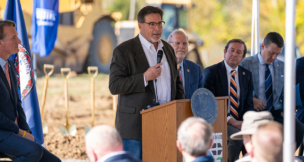Va. Tech receives record $80M grant for climate-smart farming
Pilot will pay farmers to help curb greenhouse gases
Va. Tech receives record $80M grant for climate-smart farming
Pilot will pay farmers to help curb greenhouse gases
Virginia Tech has received a record $80 million grant from the U.S. Department of Agriculture for a pilot program that will pay farmers to add practices that could help curb greenhouse gases, the university announced Monday.
The grant is the largest in the university’s history. Virginia Tech is partnering on the pilot program with Rural Investment to Protect our Environment (RIPE), a coalition of farmers, ranchers and agricultural trade association that advocates for bipartisan climate policies and the integration of fair and future-focused agricultural solutions. Called the RIPE Partnership, the program will run for three years and will pay producers $100 per acre or animal unit to adopt climate-smart practices that deliver more than that amount in public environmental benefits, according to a news release.
Some of the climate-smart practices in the program include:
- Crop practices: Cover crops; no-till; reduced till; nutrient management; conservation crop rotation; silvopasture — or tree integration; waterway, or riparian, forest buffers and riparian herbaceous cover
- Rice practices: Residue management, including no-till and reduced till; irrigation water management—alternate wetting and drying for water conservation in rice; conservation crop rotation and nutrient management
- Livestock practices: Comprehensive nutrient and manure management plan and implementation; roofs and covers; waste separation facilities; feed management to reduce intestinal emissions; prescribed grazing; nutrient management and silvopasture
The university will distribute at least $54 million to about 5,200 agriculture producers representing about 600,000 acres in Virginia, North Dakota, Arkansas and Minnesota. The money will be divided evenly among the states, with about $13.5 million going to roughly 1,300 Virginia farms, according to Tom Thompson, the principal investigator on the project and associate dean of Virginia Tech’s College of Agriculture and Life Sciences.
The states were selected based upon inclusion of a variety of agricultural systems and leveraging existing partnerships, Thompson said.
“We are proud to lead this effort that gives agricultural producers incentives to enact climate-smart practices and the financial means to do so,” Thompson, who also directs the college’s CALS Global program, said. “This is a watershed program that helps the agricultural industry be a leader in addressing climate change.”
RIPE will provide producers more than the cost of implementing new practices, which differs from cost-sharing programs that puts the financial burden of adopting climate-minded practices on producers. Producers will receive 50% of the payment upfront, 25% after implementation, and 25% after final reporting is completed. Some producers may be eligible for 100% of payments upfront.
At least 40% of participants will be underserved and small producers and a minimum of 630 operations run by socially-disadvantaged or limited-resource producers are expected to participate. University researchers will create a model to select participants to ensure diversity.
Producers also will be able to market their commodities produced via climate-smart practices to the public through certificates with tracking numbers. The tracking system will include information needed by purchasers to meet sustainability goals.
The grant will also provide $2 million to Minnesota and Virginia to implement climate-smart practices in animal feeding operations. In the near term, the pilot could reduce emissions by 320,000 metric tons of carbon dioxide for an environmental impact of $220 million. A national program could have an impact of $440 billion.
If scaled up nationally, the program could help producers reduce agricultural emissions by 55% and total emissions in the United States by 8% within a decade, with as many as 80% of agricultural producers enrolled in the program, the university said. Only about 3% of producers currently participate in carbon-reduction programs.
In Virginia, the college is partnering with the Virginia Department of Conservation and Recreation, Virginia Cooperative Extension, and Virginia State University to roll out the program. The Virginia Department of Agriculture and Consumer Services also provided support for the grant application. A website will be launched within the next few months to allow producers within pilot states to apply and enroll in the program.
The pilot will also rely on research and programs at Virginia Tech, and researchers will track the greenhouse gas savings, quantify benefits of other environmental impacts and examine consumers’ willingness to buy products with climate-smart labels.
Fifteen state and national organizations will also help implement the partnership, the university said.
“This is an extraordinarily exciting time to be involved in agriculture,” Thompson said. “Farmers have always been the great stewards of our land, and American agriculture has long been a productivity powerhouse. This pilot program will help them continue to be so for generations to come.”
















